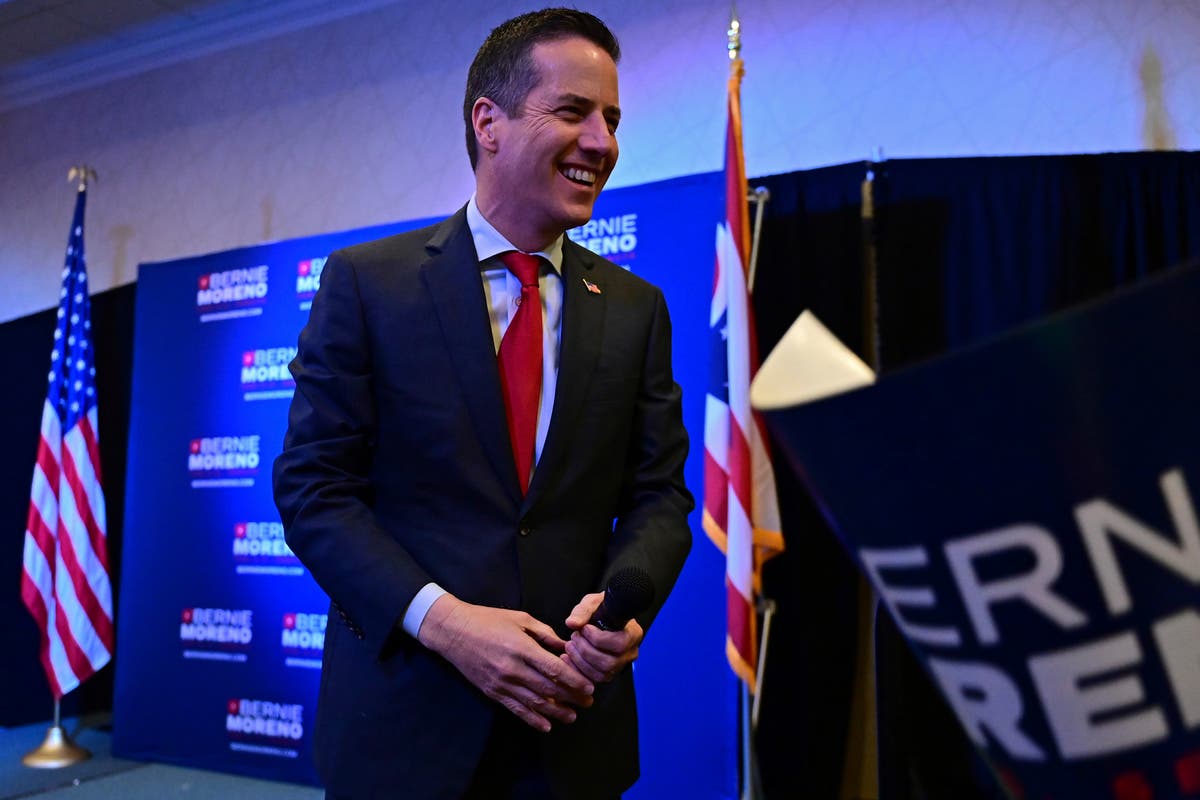Bernie Moreno decisively won the GOP nomination for US Senate in Ohio on Monday, the second candidate to be essentially carried to victory by former President Donald Trump in the state in two years.
He’ll join the other Republican with that distinction, JD Vance, in Ohio’s US Senate delegation next January if he is able to beat incumbent Democratic Senator Sherrod Brown in the fall. Mr Moreno actually ran against Mr Vance in the last election cycle but withdrew to clear the way for his one-time rival after the Hillbilly Elegy author won Mr Trump’s endorsement that year.
Tuesday evening’s victory is a sign of Donald Trump’s continued endorsement strength — particularly in the midwest and in states where he has less directly clashed with state Republican leaders. It remains far from an absolute shot at victory — just ask David Perdue, the failed 2022 candidate for governor in Georgia — but a potent force in the Republican Party nonetheless.
Indeed, it can be said that Mr Trump’s endorsement, like in Mr Vance’s case, is by far the factor most responsible for Mr Moreno’s win. The car dealership owner and his allies like Club for Growth blanketed TV networks in the state with ads touting his Trump endorsement and it appeared to be one of the only things a significant number of Republican voters knew about the two-time Senate candidate.
Outside the Dayton event, roughly a half dozen Republican voters who planned to vote in the primary spoke to The Independent; all were supporting Mr Moreno, and none could name other reasons beyond Mr Trump’s endorsement for their support.
Stan Strohmenger was one of those voters. In an interview shortly after Mr Trump’s remarks concluded and the president boarded his massive private plane, he explained that the former president’s record in the White House contributed to the reasons why his voters trust his endorsement more than that of any other politician.
“With Trump, the proof is in the pudding,” he said on Saturday. “He made promises, he kept them. He loves his country, he loves God. He wouldn’t endorse someone that wasn’t the real thing.”
Mr Strohmenger went on to explain why Mr Trump’s endorsement was more influential than others: “The thought of even trying someone else…you know what you have [with Trump]. A guaranteed ironclad. Why would you even look, if you know your car’s reliable, it’s paid for, nothing’s wrong with it? Why would you humour trading it in, not knowing what you’re going to get?”
On Saturday, that endorsement turned into a last-minute shot of adrenaline. Former President Donald Trump held a rally in Dayton, where he spoke to a few thousand supporters and urged them to turn out for his chosen candidate in the primary. It’s likely that news of Mr Trump’s rally drove home the reality of the endorsement for many voters, given a last-minute shift in Mr Moreno’s favour picked up by a final Emerson College poll released a day before the primary.
The actual margin of victory for Mr Moreno was staggering compared to what polling showed, thanks to the massive contingent of undecideds who made up their minds in the final week, possibly even the last few days of the race. It seems almost certain that the former president’s rally on Saturday, more so than the endorsement by itself, had played a serious role in tonight’s results.
His rivals certainly credited Mr Trump’s thumb on the scale for Mr Moreno’s success in the polls. At an event on the eve of the election in Columbus for Matt Dolan, the state senator with Governor Mike DeWine’s backing (and that of much of the Ohio GOP old guard), former state senate speaker pro tem Jay Hottinger had predicted that the race would be “close”, and had only become so thanks to the outsized influence of the former president.
“Candidly, this is going to be a close election…only because of that endorsement,” he said Monday evening.
Mr Hottinger had gone on to predict that supporters leaving the campaign of Frank LaRose, the third-place contender, would join the Dolan campaign in the final hours. That didn’t happen; instead, Mr LaRose ended the night with nearly 20 per cent of the vote, more than enough to make up the gap.
The question now appears not to be whether Donald Trump can still play kingmaker; that ship has sailed. It’s whether Mr Trump’s chosen candidates have any kind of appeal in a general election: a dismal performance by the likes of Mr Perdue as well as Kari Lake, Tudor Dixon and other Trump loyalists in 2022 put that very much into the realm of uncertainty.
Polling of a hypothetical Brown-Moreno matchup released earlier in March by Florida Atlantic University showed the Democratic incumbent up 11 points over his Trump-backed rival. As a three-time senator, Mr Brown has exponentially more name recognition than does Mr Moreno, and a track record to point to that Mr Moreno cannot as a stranger to elected office.
President Joe Biden, who will almost certainly be at the top of the ticket for the Democrats after mathematically clinching his own nomination earlier this month, hasn’t yet said whether he will make a stop in the Buckeye State to boost Mr Brown’s re-election chances, and it isn’t clear whether that would help given the incumbent president’s own popularity issues, particularly in a red-trending state like Ohio. But Mr Brown told Politico earlier this year that he has no intention of running against the president’s record, as some red-state Democrats choose to do.
“I run my own race and my own brand. So, I’m not going to run from Biden,” he told the news outlet in February. “He’s also delivered more than any president in recent history.”

Emily Foster is a globe-trotting journalist based in the UK. Her articles offer readers a global perspective on international events, exploring complex geopolitical issues and providing a nuanced view of the world’s most pressing challenges.








